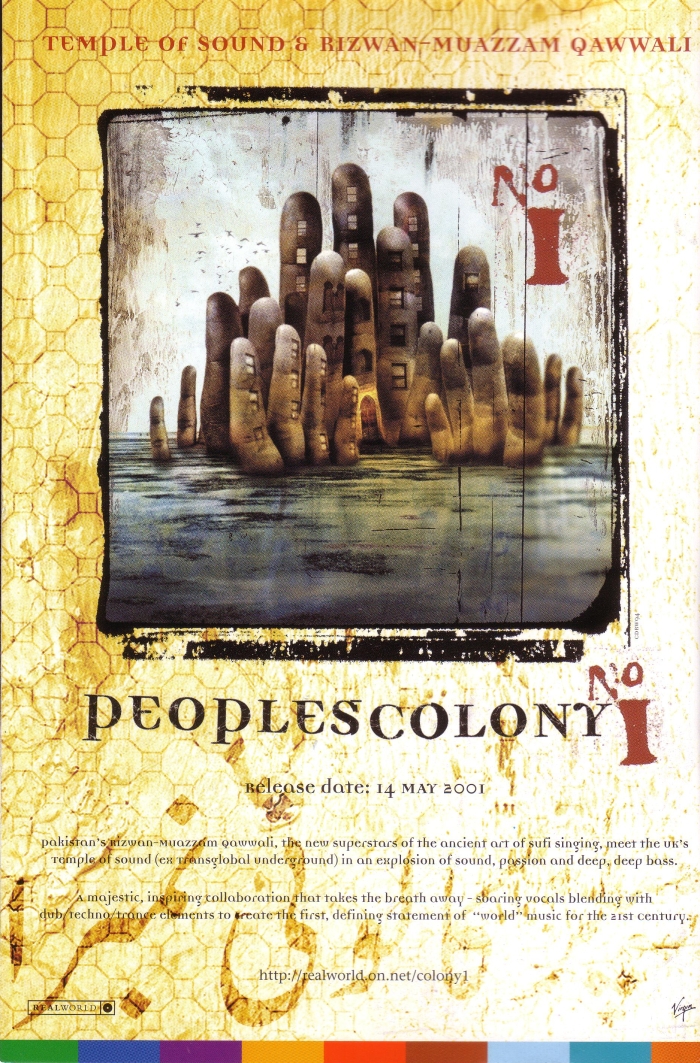
12th May 2010
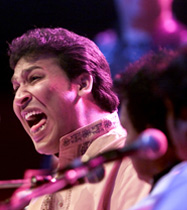
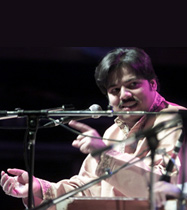
Rizwan-Muazzam Qawwali are to appear at St Georges in Bristol on Thursday 22nd July, as part of the Migrations season.
http://www.stgeorgesbristol.co.uk/event.php?pid=882
11th May 2010
Rizwan and Muazzam Mujahid Ali Khan are the torchbearers of a tradition that goes back over 700 years, the tradition of qawwali. Qawwali is an Arabic word that means "utterance" and it is the devotional music of the Sufis of Pakistan and India. When the unforgettable qawwali singer Nusrat Fateh Ali Khan died in Pakistan in 1997, he left a musical vacuum into which stepped his two teenage nephews. Despite their extreme youth, they were determined that their group Rizwan-Muazzam Qawwali should continue their uncle's pioneering efforts to transcend cultural, language and religious barriers and to bring to the world the devotional but vibrant Qawwali vocal music of the Sufi mystics of the Islam religion. Rizwan Muazzam Qawwaki have recorded four albums with Real World Records: 1999's "Sacrifice To Love", 2001's collaboration with Temple of Sound "People's Colony No 1", 2001's "A Better Destiny" and 2004's "Day of Colours".
In great demand, with followers Worldwide, Rizwan-Muazzam Qawalli appeared at the inaugural WOMAD festival on the beach in Abu Dhabi in April 2009 attracting a capacity crowd, many of whom followed them to a second appearance the next day in Al Ain's famous hill fort.
They will be making an extensive UK tour in the summer of 2010 and are open for enquiries now.
26th June 2010 - Dartington Hall, Totnes, Devon, England
6th July 2010 - Llangollen International Musical Eisteddfod, Wales
7th July 2010 - Llangollen International Musical Eisteddfod, Wales
9th July 2010 - "Voices" Royal Opera House, London, England
17th July 2010 - Southampton Mela, England
18th July 2010 - Nottingham Mela, England
25th July 2010 - WOMAD, Charlton Park, Malmsbury, Wilts, England
8th August 2010 - Edinburgh Mela, Scotland
15th August 2010 - The Drum, Birmingham, England
http://www.accessallareas.info/artist_article/20/Rizwan---Muazzam-Qawwali-.htm
January 2007
Just got back from an incredible trip to Kerala in India and amongst others, picked up this fantastically titled compilation.
18th May 2006
![]()
Download 'sample packs' of audio from Real World Records, create remixes using any software you have to hand. Upload finished mixes back to the site for others to listen and comment.

Sample Pack 3 - Temple Of Sound & Rizwan-Muazzam Qawwali
Pack three is from 'People's Colony No 1', a collaboration between'Temple of Sound" and 'Rizwan-Muazzam Qawwali'. Music from a new world inhabited by the ecstatic voices of Sufi mysticism and a mix of contemporary dub/funk/urban beats. Brothers Rizwan and Muazzam are from a direct line of Pakistani qawwali singers, nephews of the legendary Nusrat Fateh Ali Khan. Temple of Sound duo Neil Sparkes and Count Dubulah build tabla loops, bass and drums and together create a joyful backdrop to the soaring voices.
http://www.realworldremixed.com
13th August 2005
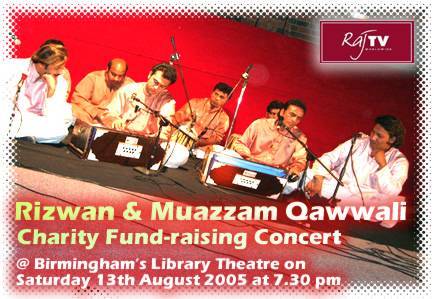
Birmingham Library Theatre, Birmingham, England
There will be a charity fund-raising concert by Rizwan-Muazzam Qawwali at Birmingham’s
Library Theatre on Saturday 13th August 2005 at 7.30 pm’ Following events
in London and elsewhere, the world-class performers of this ancient form of
devotional music in the tradition of their late uncle,Nusrat Fateh Ali Khan,
have expressed their wish to contribute to efforts to harmonise the various
communities and to help raise funds for those affected. With this in mind,
Raj TV has arranged a concert evening for all the family to enjoy. Tickets
will be widely available but if there are any problems contact details can
be found below. "Qawwali is a precious thing that has stood the test of
time," Rizwan says. "The songs connect to the human spirit and freshen
the human soul. Its main message is love and our aim is to spread peace and
understanding." The music is steeped in Sufi tradition. Some of the lyrics
are modern. But some of the poetry is 800 years old. All are love songs in
praise of the Beloved [Prophet Mohammed PBUH] and are specifically chosen for
their message of harmony and understanding. As Rashid Din, the group's manager
and producer says, "There's a very anti-Islamic feeling in some quarters
at the moment and we feel we need to show a centuries-old tradition of Islam
that never had a message of killing or hatred or any form of negativity.
We want to deliver a traditional Qawwali message of harmonisation and peace.
Tickets are £15 including refreshments.
Contact Naeem on 0121 632 1011 / 0787 548 8307 or email info@raj.tv
2nd August 2005
Listen to the Rizwan -Muazzam Qawwali performance at WOMAD 2005 here.
31st
July 2005
WOMAD
Rivermead, Reading, England
Green Room 17:30-18:30 (devotional Sufi music workshop)
BBC Radio 3 Village Stage 20:30-21:30
Open Air Stage All-Star Gala Finale 21:30-23:00
12th July 2005
RIZWAN-Muazzam Qawwali have cancelled four dates in the north west,
including one in Manchester on Sunday, due to poor ticket sales. The group,
which features the nephews of the late Qawwali superstar Nusrat Fateh Ali Khan,
perform the music of the Sufi mystics of India and Pakistan. The brothers Rizwan
and Muazzam Mujahid Ali Khan, honed their craft by studying under their father’s
guidance and were then taught by their uncle, Nusrat, himself. As well as Sunday's
date at the Apollo, the group were also set to play Bolton, Preston and Blackburn
but Steve Stackable, from promoters Manifesto Music, has confirmed those dates
have also been pulled due to poor ticket sales and there are no plans to reschedule.
Rizwan-Muazzam Qawwali’s first live UK appearance was at the 1999 WOMAD
Festival and they have recently released their fourth album to rave reviews
on Peter Gabriel’s Real World label. Ticket holders are advised to return
to the point of purchase for a refund.
3rd July 2005
Harbourfront Centre's CIBC Stage, Totonto, Canada.
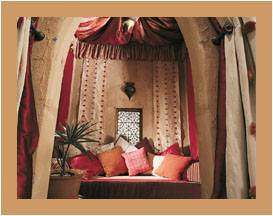
Well before the late legendary Nusrat Fateh Ali Khan sang with Peter
Gabriel on the Natural Born Killers soundtrack in 1994, Rashid Din was knee-deep
in qawwali, the exhilarating Sufi devotional music from Pakistan.
How could he not
be? Din managed Khan, who single-handedly internationalized qawwali, and that
puts him in a unique place to chart the music's trajectory from small community
centres in England to music festivals all over the world. As Din says, "He
went from playing for 100 people to playing for hundreds of thousands.
" The only people that came out to his shows in England 13 or 14 years back
were older people from Pakistan and India," Din, a relative of Khan's, says
from his home in Slough, England. "The music wasn't well known and people
didn't understand the language so it was difficult for the groups to convey the
message. Also, the songs can last between 15 minutes and two hours and people
didn't have the energy or the patience to hear something that long."
Several factors can be attributed to the increase in qawwali's popularity in
the West since those early days: Peter Gabriel signing Khan and his Party to
his Real World label and booking him to perform at his groundbreaking WOMAD
festivals all over the globe; Khan collaborating with Canadian producer Michael
Brook (though some of those efforts were atrocious easy-listening fusions for
the exotica-seeking set); and Khan's music being remixed by everyone from Bally
Sagoo to Asian Dub Foundation.
Khan's musical prowess -- his improvised, impassioned vocal runs supported
by his spirited ensemble gave me chills every time I saw him -- coupled with
his immense recording output led music hacks to ask the inevitable question
when the master passed away seven years back: who was going to fill his formidable
shoes?
Seeing Western critics calling every qawwali group in existence the inheritors
of Khan's throne was amusing. If you believed them, Khan's nephew, Rahat Nusrat
Fateh Ali Khan (whose eponymous 2001 debut was produced by Rick Rubin and released
on his American label), The Sabri Brothers from Pakistan and Rizwan-Muazzam
Qawwali were all "the next Nusrat."
Rashid Din knew better.
" When Nusrat passed away, I knew about these young lads and thought here
was an opportunity to take them forward," says Din, who manages Rizwan-Muazzam. "I
took them out in 1998; they haven't stopped touring."
Given that brothers Rizwan and Muazzam are nephews of Nusrat Fateh Ali Khan,
you can imagine the pressure on them to shine as brightly as he did. As evidenced
by their vocal dexterity, the brothers are coming through in fine style for
Khan who, Din says, felt they could effectively continue the family tradition.
" In Indian and Pakistani families it's like, if your father's a doctor
there's pressure on you to be a doctor," Din says. "Nusrat's younger
brother's son, Rahat Ali Khan, was trained by him for 15 years and he performed
with him but he didn't meet people's expectations. His voice is very tinny; it
hurts your ear and that turned people off."
Din says while Rizwan and Muazzam are proud of their lineage, they're not content
to ride on Khan's coat tails.
" It's easy for them to say, 'We're Nusrat Fateh Ali Khan's nephews,' but
to deliver the goods at the level that he did is difficult," Din says. "You
have to be of that calibre first. You have to have that talent, which they do.
Nusrat hardly slept, he sang constantly. Muazzam's the same way, he's always
singing or composing.
by Erroll Nazareth, http://www.eye.net
30th April 2005
iFest, Houston, USA
Budweiser Music Stage 2:15
15th April 2005
American Airlines Concert Hall, Chicago, USA
14th April 2005
Mershon
Auditorium, Wexner Centre, Ohio, USA
9th March 2005
Qawwali Extravaganza On Line
BBC Radio's Asian Network recently dedicated a weekend entirely
to a celebration of the extraordinary sound of qawwali music. You can listen
again on line to this series of programmes celebrating this music's ancient
mystic Sufi roots and its adaptation into modern day dance sounds. The
most famous exponant of all was Nusrat Fateh Ali Khan who recorded many
albums for Real World and worked extensively with Michael Brook and Peter
Gabriel. In his footsteps come the young rising stars Rizwan-Muazzam.
BBC
Radio Asian Network Qawwali programmes
August 2004
When the unforgettable qawwali singer Nusrat Fateh Ali Khan died in Pakistan in 1997, he left a musical vacuum into which stepped his two teenage nephews. Despite their extreme youth, they were determined that their group Rizwan-Muazzam Qawwali should continue their uncle's pioneering efforts to transcend cultural, language and religious barriers and to bring to the world the devotional but vibrant Qawwali vocal music of the Sufi mystics of the Islam religion.
Now in their mid-20s, the group's third album, Day Of Colours, finds them coming into their own with a new-found maturity in their voices and a profundity in their approach that not only maintains and furthers a family tradition but develops their own identity as singers and breathes fresh life into a centuries-old style that has today become one of the glories of modern world music.
The music is steeped in Sufi tradition. But none of the lyrics on Day Of Colours has ever been recorded before. Some of them are modern. But some of the poetry is 800 years old. All are love songs in praise of the Beloved and were specifically chosen for their message of harmony and understanding. As Rashid Din, the group's manager and producer says,
"There's a very anti-Islamic feeling in some quarters at the moment and we felt we needed to make an album that showed a centuries-old tradition of Islam that never had a message of killing or hatred or any form of negativity. We wanted a record that delivered a traditional qawwali message of harmonisation and peace."
The two brothers who lead and lend their name to the group, Rizwan Mujahid
Ali Khan and Muazzam Mujahid Ali Khan, come from a direct line of qawwali singers that can trace its family pedigree back over five centuries. Their grandfather was an uncle of Nusrat Fateh Ali Khan and taught Nusrat the art of qawwali vocal music. They themselves studied under their father, who died in 1996, and were then tutored by Nusrat.
The word qawwali simply means 'utterance' and the music and style of performance it describes has been a feature of Islamic culture since the
12th century. It is religious music that uses the human voice as a vehicle to enlightenment by evoking the name of the Beloved in a quest for transcendence. The two lead singers, Rizwan and Muazzam, lead five back-up singers and in their call-and-response patterns, key phrases are repeatedly chanted to the accompaniment of rhythmic handclapping, percussion and harmonium. The lead singer adds elaborate vocal lines and the tempo and volume are gradually increased as the piece progresses to a heightened trance-like state.
For centuries qawwali was song solely in a religious context at the shrines of the great Sufi saints. The broadening of its appeal is very much a family innovation - it was Nusrat's father and uncle who first introduced qawwali singing at social events. To the performers, 'the Beloved' addressed in the songs is invariably Allah or a Sufi saint. But romantic love is used as a metaphor for spiritual adoration. "They are all love songs in praise of the deity, but the Beloved is really whoever you follow," Rashid Din explains. "The beloved can be anyone, which is why qawwali music has found such a resonance around the world beyond Islamic communities. It transcends language and speaks to the human soul."
The broadening of qawwali's appeal was central to Nusrat's mission and it is an approach shared by Rizwan-Muazzam. Their debut album Sacrifice To Love, released on Real World in 1999, was an entirely traditional album. So was its 2001 follow-up, A Better Destiny. But they have also released a remix fusion album with Temple Of Sound. "We'll collaborate with anyone if it is done well and expands the appeal and understanding of qawwali," Muazzam says.
Day of Colours finds them returning to the purity of the qawwali tradition with stunning results. Recorded in four days in a tiny studio in Lahore, the passion is palpable. Performed in Persian, Urdu and Punjabi, the songs are both ancient and modern. Light Of My Life /Sayyedo-Sarwer Muhammed was written by the 13th century Persian poet and mystic, Rumi. One and Only
One/Ik-Machaeya-Shore was composed by the Sufi saint Baba Bulleh Shah and is also centuries old. So, too, is Lost In Love/Ub-Ho-Gea-Hay, written by
Khawaja Muhammad Devaan, the Sufi saint followed by Nusrat and his entire family, including Rizwan and Muazzam.
On the other hand, Life and Soul/ Qalandar Lal Lajpaal and In The Name Of
Love/ Sub Hasratoon-Ka have contemporary lyrics that work both as songs of spiritual devotion and expressions of secular love. The album concludes with the ecstatic title track, which boasts another ancient but previously unrecorded lyric by the Sufi master Hazrat Amir Khusrau, a 13th century poet and composer who is credited with inventing the sitar and tabla and is also regarded as the father of the Indian raga. It is the most important piece on the album and is traditionally sung at the end of every qawwali session and marks the moment when performers and audience believe the Beloved is present.
"Qawwali is a precious thing that has stood the test of time," Rizwan says.
"The songs connect to the human spirit and freshen the human soul. It's main message is love and the aim of this record is to spread peace and understanding."
"We know that no one can emulate Nusrat," Muazzam adds. "We just want to carry on where he left off and God willing, we can take the craft forward."
The spirit lives on.
July 24th 2004
Grand
Performances, Los Angeles, USA
14th January 2003
A forthcoming tour European tour is being planned for this year. This may include
an appearance at Womad.
15th September 2003
"FUN-DA-MENTAL - THE DVD"!!
Originally, it was going to be a singles compilation album but then Nation
Records thought that was too predictable. So it will be their first venture
into DVD format.
The DVD will contain all of F-D-M's promo videos, including the powerful "Dog
Tribe" and the awesome "GodDevil", bonus rare live recordings
as well as a documentary on the history of the group, their views, their motives;
interviews with members, past and present and plenty of live footage. Also
footage of their work and performances with Rizwan-Muazzam Qawwali Group will
be included, which will make this DVD an essential purchase. If time is on
their side, Nation will hopefully have this released before the end of 2003....
13th April 2002
Salle des Variétés Monte-Carlo live performance at the Printemps des Arts in Monte-Carlo
29th November 2001
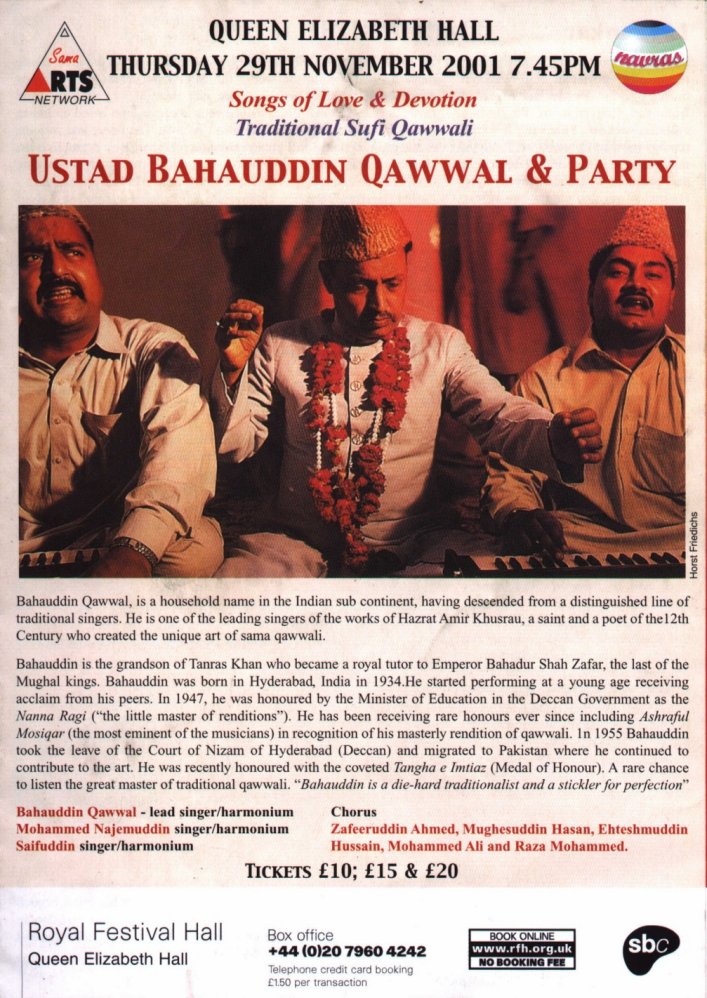
28th July 2001
WOMAD
Rivermead, Reading, UK
Village Stage 22:30-23:45
29th July 2001
WOMAD Rivermead, Reading,
UK
Whirl-Y-Gig 19:30-20:15 with Temple of Sound
2001
A Better Destiny. The new album from Rizwan-Muazam Qawwali Group - the youngest and most exciting group of Qawwali singers to emerge from Pakistan over the last decade. The group are torch bearers in the long line of tradition in Qawwali vocal music - devotional praise and love songs based upon classical Islamic and Sufi texts.
May 2001
"The essence of a collaboration is people... what drives them, their dreams, aspirations, their daily rhythms. We're not so dissimilar. On the journey I've travelled and worked alongside peoples of all cultures, tongues and walks of life - always improvising and never straying too far from the music."
Thus speaks Neil Sparkes, poet, painter, musician and global dub professor. Neil and fellow traveller Count Dubulah remember one particular late summer evening in 1993 with vivid clarity. It was at the WOMAD Reading festival and the two young global tearaways, already famed for their work in the pioneering global fusion outfit Transglobal Underground, were experiencing their first encounter with the tender ballistics of the late and legendary Nusrat Fateh Ali Khan's voice. It was, by all accounts, one of THOSE moments and in Neil's own words "an intense, joyous and overwhelming experience." The voice penetrated the blood and sinews and led to a deep interest in Sufism, the spiritual code that inspires Qawwali music from Pakistan. Neil explored the texts of the great Sufi poets like Farid Ud-Din Attars, Idries Shah and writers who embodied a Sufi aesthetic at one step removed like Paul Bowles. His interest was watered and fed by musical and poetical collaboratons with the likes of Kudsi Erguner, the Kurdish nay maestro, Hossam Ramzy, the Egyptian percussionist or ex-Last Poets wordsmith Jalal Nuriddin with whom Sparkes used to spend long nights discussing, cogitating, reasoning on Islam and Sufi's most famous text 'The Conference Of The Birds' by Farid Ud-Din Attars.
All of this seemed to be leading with its own inexorable logic to Spakes and Dubulah's direct involvement in a Qawwali project. The pair formed their own post-Transglobal vehicle for global sound exploration and called it Temple of Sound. The new vehicle came to the attention of Rob Bozas and Amanda Jones at Real World and they were signed to a publishing deal with Real World Works.
Meanwhile, in another corner of the Real World, Muazzam and Rizwan Ali Khan, the new stars of the great Ali Khan dynasty of Qawwali singers and grand-nephews of Nusrat himself, were looking to expand and 'collaborate' beyond the traditional frontiers of their music. Rashid Ahmed Din, who manages the brothers as he once did their famous uncle, takes up the story. "The idea of a collaboration came from me. Having worked with Nusrat in the past and now his nephews, who are carrying their family tradition, I wanted to follow in the footsteps of their Late Great Uncle. The group have been working with Real World Records for the past three years and now the record company felt it was the right time for them to have a collaborating album. It was the idea of the record company to collaborate with Temple of Sound. We never knew them or their work until they prepared some demo tracks for us while we were on our European summer tour. The demo work was very much liked by Rizwan and Muazzam and they were happy to work with Temple of Sound." Neil and Dubulah were, unsurprisingly, rabidly delighted by the idea. Yet they were also conscious of the fact that such collaborations can often be shallow and cheap in spirit, driven more by marketing greed than deep musical connectivity. "We all agreed this was not to be a mere bolting of beats to the groups identity" explains Neil. "This was going to be 21st Century Qawwali - organic meets technological, moving all our traditions forward. For all of us the album is a clear signpost of where our growing family of musicians who have undertaken this particular musical journey over the last ten years or more have been and can go." Furthermore, the collaboration had to be 50/50 or nothing at all.
Sparkes, Dubulah and engineer Cai Murphy got to work down at Real World, initially in the scary-sounding Bunker and subsequently in the studio's famous Big Room. "The rapport was immediate", remembers Sparkes. "Rizwan and Muazzam carry on their not inconsiderable shoulders the living Qawwali family tradition of several hundred years and with it bring their own insight and perception. Dubulah and I were keen to represent the ensemble feel and then target and highlight unique essences within the group." Rashid Ahmed Din played a vital role of bonding the two camps together in the studio. "Initially it was a bit difficult for both brothers to understand what to do and when" he says. "It was hard to adapt the singing to a fixed rhythm track given that they were not experienced in singing to a click or even to a strict time scale. It was made easier by planning. Through my experience with Nusrat and other artists in the West I was able to assist them in the mechanics of collaborating with a western group." Recalling the various sessions at Real World and then back in London at the studio in Wapping in the shadow of Hawksmoor's St Georges Church, Sparkes word scintillate with poetic excitement. "You can hear the sunrise on 'Paradise...' the last notes of the track fading as night turned blue then dawn spilling through the glass walls of The Big Room. The same with 'Palace at 4 am' written in The Bunker in the small hours after wandering the grounds dodging bats. With 'Solar East' you get that vibe, the studio atmosphere electric, control room always full during recording, Rizwan and Muazzam with us all the way."
The result of all these musical adventures is the album 'Peoples Colony No 1' which will see the light of day on the Real World label in early 2001. The family are all there, buzzing with the deep loping rhythms - Zafar Ali Khan the Bruce Lee of the tabla, the Cuban violinist Omar Puente sounding intriguingly Arabic, Jah Wobble and his booming bass shaking the fundamentals, Kevin Haynes injecting the spirit of Santeria into musical body with his percussion, Harry Becketts on the brass. As Sparkes recalls with pride, "At the end of every night - early morning, none of us wanted to leave." The result is majestic, taking up the Qawwali story from where it was left after Massive Attack's remix of Nusrat Fateh Ali Khan's 'Mustt Mustt'. There's talk of taking the project out on tour and collaborating on further in the studio next year. Sparkes will no doubt fly!
22nd
July 2000
WOMAD
Rivermead, Reading, UK
Siam Tent 13:00-14:00
23rd July 1999
WOMAD Rivermead, Reading, UK
Village 23:15-00:00
24th July 1999
WOMAD Rivermead, Reading, UK
Siam Tent 17:15-18:30 with Fun^Da^Mental
June 1999
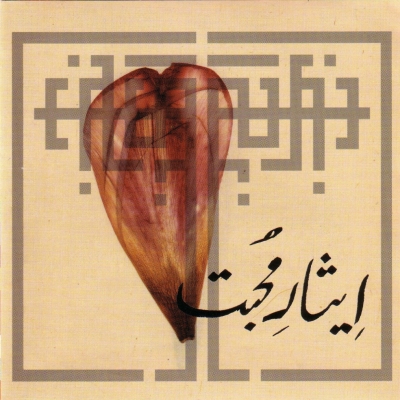
Sacrifice to Love
Qawwali, an Arabic word meaning "utterance", is the devotional music of the Sufis of Pakistan and India, the mystics of the Islamic religion. The term includes both the medium and its performance, and has been a dominant feature of Islamic culture since the 12th century.
It was the energetic recordings and concerts of the late, great artist, Nusrat Fateh Ali Khan (1948-1997) which first introduced Qawwali music to Western audiences. His singing effortlessly transcended language and cultural barriers, and his spirit reached and moved people all over the world. Today, Qawwali is seen as one of the world's most passionate and vibrant forms of music.
Pakistan's fresh young ensemble, Rizwan-Muazzam Qawwali, though still in their teens, are already proving to be masters of this Sufi devotional music. The two young brothers who lead the group, Rizwan Mujahid Ali Khan and Muazzam Mujahid Ali Khan, have an impeccable musical pedigree - their grandfather was an uncle of Nusrat Fateh Ali Khan and personally taught Nusrat the art of Qawwali singing.
These nephews of Nusrat Fateh Ali Khan, then, come from a direct family line of Qawwali vocal music that spans over five centuries. Their inventive reinterpretations of spiritual love songs based upon classical Islamic and Sufi texts was first showcased in the UK in July 1998, at the WOMAD Festival in Reading, and received much critical acclaim.
Performers of Qawwali believe that they have a religious mission: to evoke the name of Allah in a quest for total transcendence. They use music as a vehicle to enlightenment or inner knowledge - via rhythmic handclapping, percussion, harmonium and a vast repertoire of sung poetry. By repeatedly chanting salient phrases, they transport audiences to a spiritual nirvana or trance-like state.
Rizwan-Muazzam Qawwali is made up of two lead singers (Rizwan and Muazzam), five secondary singers leading the choral response and vigorous hand claps, two harmonium players and a tabla player. They perform in traditional Qawwali style - sitting on the ground rather than on seats - which they believe brings them closer to God.
A song will usually begin with a slow instrumental vamp that introduces the melody. The lead singer then meanders in with the first line and establishes a call-and-response pattern. Phrases are repeated over and over again, punctuated by sudden and furious breaks of florid virtuoso singing by the leader. As the piece progresses the tempo and volume are gradually increased, elevating the listeners to higher and higher states of entrancement. Traditionally, women are forbidden to sing Qawwali.
The original Qawwali repertoire of Farsi (Persian), Punjabi, and Braj Bhasha (an old form of Hindi) has given way in recent times to Urdu and Arabic. Romantic love is used as a metaphor for spiritual adoration and mystical enlightenment, drawing upon a rich vein of poetic imagery. It is not surprising, therefore, that Qawwali has become the staple of Bollywood film scores.
'Sacrifice to Love', Rizwan-Muazzam Qawwali's debut album on Real World Records, will be available from 28 June 1999. Produced by John Leckie, it features four of their own compositions: a 'hamd' - a song in praise of Allah; a 'manqabat' - a song in praise of a great Sufi saint; a 'naat' - a song in praise of Prophet Mohammed; and a 'ghazal' - a love song with contemporary lyrics. The group's passion for this venerable and transcendent genre is unmistakeable.
The tradition carries on.
July 1998
These nephews of Nusrat Fateh Ali Khan, come from a direct family line of Qawwali vocal music that spans over five centuries. Their inventive reinterpretations of spiritual love songs based upon classical Islamic and Sufi texts was first showcased in the UK in July 1998, at the WOMAD Festival in Reading, to much critical acclaim, and has since journeyed to the far corners of the globe.
1998
"Attish: The Hidden Fire" released.
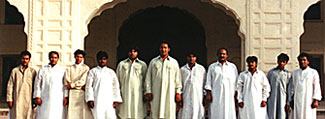
Rizwan-Muazam Qawwali Group are the youngest and most exciting group of Qawwali singers to emerge from Pakistan over the last decade. The group are torch bearers in the long line of tradition in Qawwali vocal music - devotional praise and love songs based upon classical Islamic and Sufi texts.


